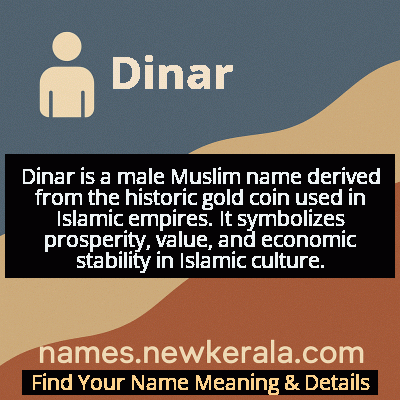Dinar Name Meaning & Details
Origin, Popularity, Numerology Analysis & Name Meaning of Dinar
Discover the origin, meaning, and cultural significance of the name DINAR. Delve into its historical roots and explore the lasting impact it has had on communities and traditions.
Name
Dinar
Gender
Male
Origin
Muslim
Lucky Number
1
Meaning of the Name - Dinar
Dinar is a male Muslim name derived from the historic gold coin used in Islamic empires. It symbolizes prosperity, value, and economic stability in Islamic culture.
Dinar - Complete Numerology Analysis
Your Numerology Number
Based on Pythagorean Numerology System
Ruling Planet
Sun
Positive Nature
Leaders, ambitious, highly driven, self-reliant, innovative.
Negative Traits
Overly aggressive, domineering, impatient, selfish.
Lucky Colours
Red, orange, gold.
Lucky Days
Sunday.
Lucky Stones
Ruby, garnet.
Harmony Numbers
2, 3, 9.
Best Suited Professions
Entrepreneurs, managers, engineers.
What People Like About You
Courage, determination, leadership.
Famous People Named Dinar
Dinar ibn Dinar
Islamic Scholar
Early Islamic jurist and narrator of Hadith in Basra
Dinar al-Aswad
Military Commander
Abbasid military leader known for his campaigns in Central Asia
Dinar Z. Ahmed
Businessman
Modern entrepreneur in the Middle East focusing on fintech and Islamic banking
Name Variations & International Equivalents
Click on blue names to explore their detailed meanings. Gray names with will be available soon.
Cultural & Historical Significance
In naming traditions, Dinar carries forward this legacy of prosperity, stability, and universal value. The name evokes memories of eras when Muslim civilizations led global trade and innovation, making it particularly meaningful for families with connections to commerce, banking, or Islamic scholarship. Beyond its economic connotations, the name symbolizes the enduring values of trust, reliability, and intrinsic worth that characterized the historic dinar coin - qualities that parents hope to instill in their children. This cultural resonance makes Dinar a name that bridges historical Islamic achievements with contemporary aspirations.
Extended Personality Analysis
Individuals named Dinar typically exhibit characteristics of reliability, practicality, and strong value orientation. They tend to be grounded individuals who understand the importance of stability and long-term planning, often demonstrating excellent judgment in both personal and professional matters. Like the precious metal their name references, they usually possess an inherent sense of self-worth and dignity that others find compelling and trustworthy.
In social settings, Dinars are often seen as dependable friends and partners who value quality over quantity in relationships. They typically have a keen eye for recognizing true value in people and opportunities, avoiding superficial attractions in favor of deeper, more meaningful connections. Their personality often reflects the historical role of the dinar coin as a stable medium of exchange - they tend to be consistent, measured in their responses, and maintain their core values even in challenging circumstances. This combination of practical wisdom and steadfast character makes them natural leaders in business and community settings.
Modern Usage & Popularity
In contemporary naming practices, Dinar maintains a distinctive presence as a meaningful choice that reflects both cultural heritage and modern economic awareness. The name sees consistent though selective usage primarily in Muslim-majority countries, with notable popularity in regions with strong Islamic banking sectors such as Malaysia, Indonesia, and the Gulf states. While not ranking among the most common names, it enjoys particular favor among families with backgrounds in finance, commerce, or Islamic scholarship who appreciate its historical and economic symbolism. Recent years have seen a modest resurgence in its usage as global interest in Islamic finance grows and as parents seek names that combine traditional roots with contemporary relevance. The name's appeal lies in its unique combination of historical depth and modern economic consciousness, making it a thoughtful choice for parents valuing both cultural continuity and forward-looking perspectives.
Symbolic & Spiritual Meanings
The name Dinar carries rich symbolic meanings that extend far beyond its literal reference to currency. Symbolically, it represents intrinsic value and enduring worth - much like gold maintains its value regardless of economic conditions. The name suggests qualities of purity, reliability, and trustworthiness, echoing the historical role of dinar coins as trusted mediums of exchange across diverse cultures and regions. Metaphorically, it represents someone who, like precious metal, reveals their true value over time and maintains their essential qualities through life's challenges.
Additionally, Dinar symbolizes measured exchange and fair value - suggesting a person who understands balance and equity in relationships and transactions. The name carries connotations of economic wisdom and the ability to distinguish between superficial appearance and genuine worth. In a broader sense, it represents the idea that true value lies not in external validation but in inherent qualities that withstand the test of time, making it a powerful symbolic choice that speaks to lasting character and substantial personal qualities.

